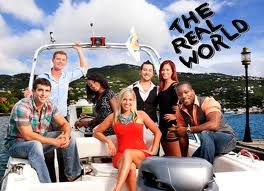Anxiety
Real World St. Thomas: The Many Forms of Stupidity
Why you can act stupid without being stupid
Posted July 17, 2012

“Real World: St. Thomas,” the latest installment of the long-standing reality television series in which a group of young strangers squeeze together under one roof for three months to share their lives with a mass audience, has come under some criticism since it aired a few weeks ago.
And when I say “criticism” I don’t mean to suggest that the folks on this show have done anything particularly controversial, or that the show-runners have tweaked the format in any particularly problematic way. What I mean is that bloggers, podcast hosts and others who have publically commented on and discussed the show have been atypically more negative in their perceptions of the cast members. It all seems to be a little bit more accusatory and irritable than usual.
As far as I can tell the show has been critiqued for everything from being too boring to being too melodramatic. But mainly it gets critiqued for being filled with people who seem to act with significant "stupidity". Why is "stupidity" in quotes—because it’s a simple, common and catchy phrase that I’ll use as an umbrella term for maladaptive, impulsive, irrational and all the other negative descriptors of behavior that are implicitly associated with the term.
Now, before I go further I want to pause for a little soapbox time. I’d like to remind everyone who chooses to publically comment on the lives of the people on this show that they are people, not storybook characters. Yes, they signed up for the experience, which should serve as an implicit contract to be evaluated and judged by an inherently evaluative, judgmental and finicky public. But I still believe that those of us that reside in the "public" should be able to judge and critique with the basic respect and thoughtfulness that we ourselves would desire if we were on the other side of the looking-glass.
So, what do I mean when I reference critics of the show and land on the term "stupid?" What is particularly, annoyingly "stupid" about this crop of cast mates?
Well, within the first 24 hours of meeting and living with each other here’s what the St. Thomas cast has done:
Marie and Robb have developed a mutual crush on each other. This wouldn’t be particularly "stupid" except that they’ve decided to play hard to get while simultaneously reacting with hurt at the ‘hard’ part. That was fast. Speaking of fast crushes, Laura has developed, ah, romantic feelings for Trey which isn’t really a crush so much as a "love at first sight" issue. She’s falling hard and fast. She promptly showed Trey her adoption papers and sought to cuddle. Trey, in turn, felt smothered by her simultaneously and implicitly asked "for more" in his herky-jerky flirtatious response. Again, we’re still in the first day, here. Brandon starts to feel like an outsider, which is interesting because isn’t everyone still an outsider at this point? He proceeds to detail suicidal thoughts in his journal and streak naked into the Jacuzzi hoping to incite Laura’s attention. Too bad she was distracted by Trey’s biceps.
I’d like to discuss some factors that may explain this ‘stupid’ series of behaviors, which, by the way, are not the most stupid things to inhabit the world of stupidity.
An important question that seems to have escaped the public discourse on reality television in general, and Real World in particular is whether or not the actions and decisions we’re watching unfold on the screen are a product of the individual’s personality (i.e. they are stupid) or the environment within which that personality is operating.
Now, it doesn’t take a philosopher to know that the answer is undoubtably going to be “both, and.” That is, personality and situational factors perpetually work in-tandem, in feedback loops to produce the eventual outcome known as behavior and actions, etc.
And yet the public discourse, thus far, has been notably imbalanced. There’s been a predictable bias toward assuming or emphasizing the explanatory factors as 100% within the individual. Meaning, I’ve observed labels such as "conflict-avoidant," "needy puppy dog", "two-faced playa" and "plain old crazy" being used to describe Robb, Marie, Lauren, Trey, and Brandon, respectively. In other words, they are being called "stupid". This is unfair and over-simplistic to say the least. And, yes, mass arm-chair analysis of a reality television cast is inherently unfair and over-simplistic but I still think we should strive to be better.
By the way, there’s an official term for the phenomenon that I’ve been describing—in case you care about that sort of thing—it’s called the fundamental attribution error. Just to clarify, it’s when other people do something stupid and we assume it’s because, well, the person is stupid and that’s all there is to it. But when we commit that same mistake of stupidity we are acutely and perceptively aware of all the contextual factors that influenced us in making the mistake. We aren’t "stupid", we’re just tired or unlucky or the victims of a ridiculous confluence of events, etc.
Quick example to drive this home:
Recall the last time you honked at someone on the road. You honked and you probably walked away from the situation convinced that you honked because you were surrounded by idiotic maniacs who never learned how to drive properly. But when the situation is reversed, and you make a driving mistake that garners a toot or two it’s never because you’re an idiotic maniac is it? Of course not—that would be stupid. It’s because the honker has anger management problems and needs to learn patience.
So, let’s balance this out. Let’s try to view the behavior of this current season’s Real World crew through a lens that isn’t dirtied by the fundamental attribution error.
I have believed for a long time that the environment of the Real World makes people "stupid". Walk through the front door and into that Real World house and you will begin to act like a more impulsive, irrational, maladaptive version of yourself—sometimes to perplexingly significant degrees.
Why? Well, the answer to a large extent is something that the Real World injects in large doses into its inhabitants. It’s the thing that always underlies stupidity of this kind and it’s hardly ever discussed. The thing, of course, is….anxiety.
What are some of the most anxious mornings you’ve awakened to? Maybe you’re first date; maybe your first day of college; maybe your first big job interview. Why were these situations so anxiety-provoking? In addition to the novelty of it, you were stepping out into the world and into the judgment and evaluation of your character by others.
How anxiety-provoking must it be to awaken and know—without any previous experience in the limelight - that millions of people are going to learn about you in intimate detail? We’re not talking about a single day or the judgment of a single romantic interest in the Real World forum. Real World equals Real Anxiety.
And the anxiety is palpable right way. I gather it piques in the first 24 hours as there’s maximal intensity to the discomfort and maximal uncertainty about how the experience of it all is going to turn out. You can see it in the excessive excitement with which the cast mates hug each other and tour their new digs with squeals of overwrought delight. As the initial excitement dies off the anxiety continues to build to fever pitch. The cameras are rolling, and the cast is inevitably aware of the judgments that will soon form in response to how their living their 'real' lives. Surely, the cast feels it. Hell, I can feel it and I’m just a viewer.
Am I going to end up looking stupid? Am I going to become an outcast? Am I going to get kicked off the show? Am I going to get any airtime? What’s my place in the house going to be—is anyone going to like me?
These questions, and a thousand other points of self-doubt and fear, are likely whirling away in the minds of these young cast mates, these partially formed and intensely vulnerable sets of identities.
The anxiety does what it is designed to do - amp up the situation and propel a fight-or-flight response that tends to lead to frantic, impulsive, excessively emotional decisions and actions.
It’s why:
Two people develop crushes who clearly aren’t used to developing crushes; it’s why a sweet girl throws herself at a guy with reckless abandon and why that guy gets paralyzed with ambivalence; and it’s why a sensitive, insecure Bostonian gets emotionally dys-regulated.
I’m not going so far as to suggest this situational component of transitioning into a new world of constant public surveillance, and anticipatory apprehension about coming across well transforms people into someone other than who they really are. Anxiety doesn’t transform, but it does exaggerate and intensify pre-existing patterns and tendencies. For instance, what Robb and Maria do with each other is an amped-up version of being conflict-avoidant in relationships. What Laura does is an amped-up version of wanting love (as the adoption papers might suggest). What Trey does is an amped-up version of not quite knowing himself yet (as his experience with an abandoning father might suggest). And what Brandon does is an amped-up version of emotion regulation difficulties (as the cuts on his arms from compulsive ‘cutting’ would suggest).
What started as an empathic nod to a highly-critiqued group of cast mates seems to have turned into a cautionary tale about reality television.
My prescription for future real-world cast mates—prepare for that initial tidal wave of anxiety, and don’t underestimate it. Otherwise, people will mislabel you as "stupid" when, in reality, you’re simply struggling to manage invisible but daunting situational anxiety that can make us the "stupid" version of ourselves.




